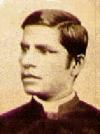Lal Behari Day was an eminent Bengali Christian missionary and educationist who was a student and later, a colleague of Alexander Duff. He was also a pioneer of Indian writing in English and wrote Govinda Samanta or Bengali Peasant Life(1874) and Folk Tales of Bengal (1883) See: http://www.gutenberg.org/ebooks/38488. Charles Darwin wrote a letter to Day's publisher commending Govinda Samanta and the Folktales was praised widely, including in The Spectator (http://archive.spectator.co.uk/article/27th-october-1883/21/folk-tales-o...).
He was born Kala Gopal Dey [his name was changed to Lal Behari later on] on 18 December 1824 to a poor banker caste family at Talpur in the Burdwan district. He was brought to Calcutta by his father, against the wishes of other family members, and was admitted to Reverend Duff’s General Assembly' Institution (now [The Scottish Church Collegiate School], as one of the first five boys admitted by Duff/Scottish Church College). He studied there from 1834 to 1844. Day amusingly mentions how he was refused admission to David Hare's Hindu College (now Presidency University) because the atheist Hare feared that Day would convert the Indian students to Christianity. At the General Assembly Institution, Day was awarded the first prize for an essay on the conversion of St. Paul and on 23rd July 1843, he was baptised. During his time at the Institution, he was a close comrade of Mahendralal Basack (http://readinggamesplayingbooks.com/dutch/node/486) and Kailash Chunder Mukherjee (http://readinggamesplayingbooks.com/dutch/node/490) who had both been baptised before him and who also became native catechists.
The news of the disruption of the Church of Scotland reached India in May 1843 and Day opted to join the Free Church. He underwent theologial training and was ordained in 1855 and appointed minister for the Khulna mission. During his training, he learned Greek, Hebrew and Christian Theology. In 1861, he became the pastor of the Native Church at Cornwallis Square [now Urquhart Square - the church itself is called Duff Church] and continued until 1863 when he joined the government education service. Day also engaged in a debate against Keshab Chandra Sen of the Brahmo Samaj. It must be noted that just after his ordination and that of his fellow native catechists, Day was part of a controversy because he has expected to be put on the same ecclesiastical footing as the European missionaries. However, Duff objected to this and even called him the 'ringleader of the cabal'; Day stuck to his position and finally got the Khulna appointment.
From 1867 to 1889 he worked as professor of English in Government-administered colleges at Berhampore and Hooghly. After having served in several churches in the prime of his career, he joined the Berhampore Collegiate School as Principal in 1867. Later he became Professor of English and Mental and Moral Philosophy in Hooghly Mohsin College of the University of Calcutta and continued there from 1872 to 1888. Being a devout Christian but pro-British Raj, he protested against any discrimination practised by the ruling class against the natives.
He was made a Fellow of the University of Calcutta from 1877.
He died on 28 October 1892, at Calcutta.
Further reading
Macpherson, G., 1900. Life of Lal Behari Day, Convert, Pastor, Professor and Author. T. & T. Clark.

Sarbajit Mitra

